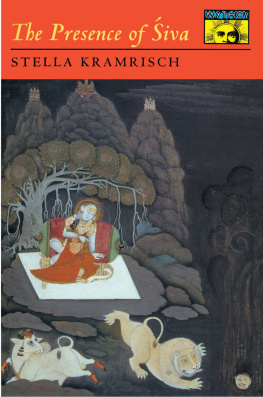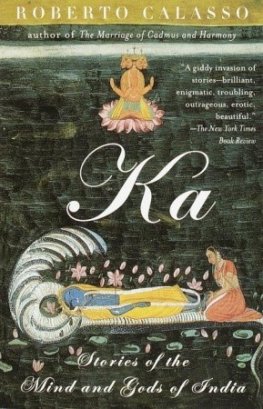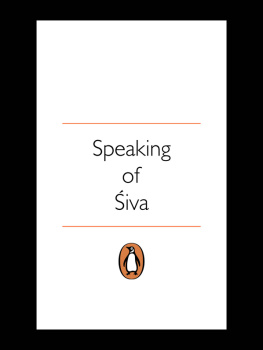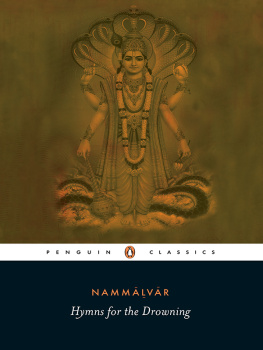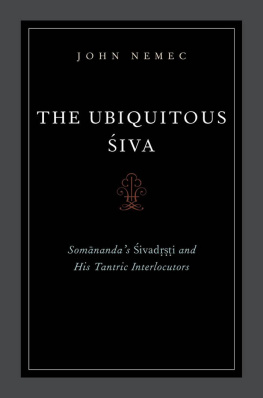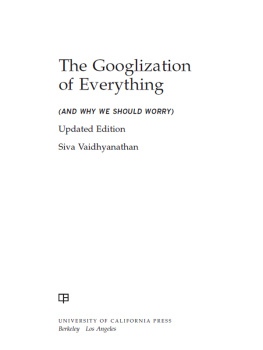The Presence of iva
Published in cooperation with the
Philadelphia Museum of Art
The Presence of iva
STELLA KRAMRISCH
PHOTOGRAPHY BY PRAFUL C. PATEL
PRINCETON UNIVERSITY PRESS
Published by Princeton University Press,
41 William Street, Princeton, New Jersey 08540
In the United Kingdom
by Princeton University Press, Chichester, West Sussex
Copyright 1981 by Princeton University Press
All Rights Reserved
LIBRARY OF CONGRESS CATALOGING IN PUBLICATION DATA
Kramrisch, Stella, 1898
The presence of iva.
Bibliography: p.
Includes index.
1. iva (Hindu deity)Art. 2. Sculpture, Hindu
IndiaElephanta Island. 3. Cave templesIndia
Elephanta Island. 4. Sculpture, HinduIndiaEllora.
5. Cave templesIndiaEllora. I. Title.
NB1007.S67K7 704.948945211 80-8558
ISBN 0-691-03964-X
ISBN 0-691-10115-9 (lim. pbk. ed.)
ISBN 0-691-01930-4 (Mythos paperback edition)
eISBN: 978-0-691-22422-0
R0
CONTENTS
ix
xi
LIST OF ILLUSTRATIONS
p. 444
ELEPHANTA
ELLORA
ACKNOWLEDGMENTS
This book took shape over about ten years and I am grateful to those who read various drafts of the manuscript, edited the English, and checked the references to Sanskrit texts. Paul Todd Makler, Dorothy Norman, and Svatantra Kumar Pidara gave their unstinting help during the earlier phases. Guy Welbon made valuable suggestions concerning the substance of the text; Darrel Sewell added constructive comments to the Appendix. Susan Oleksiw painstakingly revised in its final form the language and accuracy of the manuscript with regard to its sources. To her in particular, to all those who helped, and to the authorities of the Philadelphia Museum of Art who facilitated my work, I am indebted forever.
Grateful acknowledgment is due to the Archaeological Survey of India for granting permission and facilities to Praful C. Patel to take photographs at Ajanta and Ellora.
GUIDE TO PRONUNCIATION
Vowels should be pronounced as in Italian; a lengthening sign as in indicates a long vowel; e and o are always long; in Sanskrit is a vowel and should be pronounced similar to the ri in ring; c should be pronounced as in church, j as in joy; and similar to sh in ship; h after a consonant should be pronounced distinctly as the th in hot-house.
The Presence of iva
I
THE PRIMORDIAL SCENE
1. RAUDRA BRAHMAN
His name is not uttered. It must not be mentioned; only indirectly is He to be referred to (AB.3.34).
A hymn of the g Veda (RV.10.61), the most sacred and most ancient work of Indian religious tradition, begins by calling itself a wild creation or a poem about the Wild God (raudra brahman) (RV.10.61.1). The hymn knows whom it evokes by these words, for His presence is in these words. In the lucid frenzy of the images of the hymn He arises and abides.
It is when time is about to begin. In the dawn of the world, when the black cow of cosmic night lies with the ruddy cows of morning (RV.10.61.4), two figures appear, the Father and the virgin daughter, his own daughter. They are the two actors in the primordial scene. The Father makes love to the daughter. Suddenly he pulls back, his seed falls down to earth, the place of sacrifice (RV.10.61.5-7). In their concern the gods created a poem, a word of power (brahman) and out of this they gave shape to Vstopati, the guardian of the dwelling, the guardian of sacred order (vratap) (RV.10.61.7). Like a raging bull did the Father foam, running this way and that way and away with scant understanding. Like one rejected she sped south (RV.10.61.8), into cosmic night. In spite of this mishap or on account of it, soon the patter was heard on earth of the progeny of the Father (RV.10.61.9).
Creation is an act of violence that infringes upon the Uncreate, the undifferentiated wholeness that is before the beginning of things. And yet another act of violence is hinted at, and this act is kept secret in these wild and portentous mantras. He is implied, for it is He who is invoked in this hymn. He, the most powerful, who with the arrow in his hand hit the target (RV.10.61.3). The Father was made to pull back from the creative act that was to be prevented or undone by Him, yet lead to the existence of life on earth. Without revealing their source, sparks of meaning flare up in tense brevity in the raudra brahman.
A hymn to Agni, the Fire (RV.1.71), sheds light on His nature whose name the raudra brahman withholds. This hymn celebrates Agni, who had prepared the seed for Father Heaven. But when Agni noticed the lust of the Father for his daughter, this hunter crept along, then boldly shot his arrow at the Father just when he was quenching his desire in his daughter. The hunter had aimed at the creative act itself. Father Heaven shed his seed. It fell to earth. Agni, the Fire, brought to life the Fathers progeny, the benevolent host of immaculate Fire-youths (RV.1.71.5, 8).
Fire is a hunter. The flame creeps along, lashes out, it hits the victim with its dart. The arrow of Agni strikes the Father in his passionate embrace of the daughter. But Agnis heat had also ripened the seed in the Father. Foaming in hot fury when he is struck by the fiery arrow, the Father spills his seed on the earth, the site of sacrifice, where it will sprout in the splendor of the immaculate and benevolent Fireyouths, the host of the Agirases, Agnis priests.
The ambiguity of Agni is the ambiguity of fire itself, which both sustains and destroys life. But inasmuch as the Father is the object of this ambiguity, Agni is the name of the hunter who is but a mask of Him whose name is withheld and to whom the gods, the celestial intelligence, in compassionate insight give shape as Vstopati, the guardian of the dwelling, the guardian of divine law (vratap). They carved (atakan)arises in his unfathomable nature and paradoxical shape as guardian of sacred order, lord of vstu.
The mystery of creation in this simultaneity of manifestations begins with a fateful shot, the wound it inflicts on the Father, the loss of his seed, its fall to earth, and the birth of the poem and of mankind to be. In the beginning is the word sung by the gods, the celestial intelligence, compassionate witnesses of primal passion and of the deed of the hunter. The mystery of the raudra brahman embraces the cosmic creative act together with the form-engendering creation of the poem. The brahman tells of the mystery and at the same time tells of its mode of telling. It shrouds and at the same time conveys His name in the form it gives to him by calling itself a raudra brahman, a wild creation, or Rudraic creation, for this poem and the creation are of Rudra, the Wild God. Raudra, an adjective from Rudra, means wild, of Rudra nature. Rudra as the name of the god would signify the Wild One or the Fierce God. According to later Vedic tradition, however, the word Rudra is derived from rud, to cry, howl (TS.1.5.1.1; MS.4.2.12; B.6.1.3.10). While the words of the mantras conjure up the primordial action and evoke the entire myth, they also carry the effect of this action on the gods, that is, on the evoking consciousness. Reflected in that consciousness, the action acquires the form of the poem. In this transmutation the main actor, whose name is withheld because his action and its effect on his victim fully identify him, arises not as Fire, not as Wild Archer, but as Vstopati, guardian of the dwelling and guardian of sacred order (

